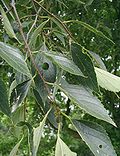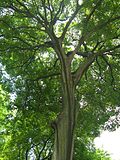Celtis
Celtis, commonly known as hackberries, is a genus of deciduous trees and shrubs in the hemp family, Cannabaceae. The genus is widespread, encompassing various species native to many regions across the globe, including North America, Europe, Africa, Asia, and Australasia. Celtis species are recognized for their adaptability to a range of environments, making them important both ecologically and horticulturally.
Description[edit]
Celtis species vary greatly in size and form but are generally medium-sized trees, reaching heights of 10 to 25 meters. They possess simple, alternate leaves that are often asymmetrical at the base. The leaves are typically serrated or entire along the margins. Flowers of Celtis are inconspicuous, small, and greenish, appearing in spring. These trees are monoecious, with male and female flowers developing on the same plant. The fruit is a small drupe, often berry-like, containing a single seed. The fruits are a source of food for various bird species, thereby playing a significant role in seed dispersal.
Ecology[edit]
Celtis trees are adaptable to a wide range of soil types and environmental conditions, which is why they can be found in diverse habitats. They are often used in urban landscaping due to their resistance to drought and pollution. In natural ecosystems, Celtis species contribute to the biodiversity by providing habitat and food for numerous bird species, insects, and mammals. Their ability to thrive in various conditions also makes them important for soil stabilization and reforestation projects.
Uses[edit]
Historically, Celtis wood has been used for various purposes, including furniture, tool handles, and firewood, due to its hardness and durability. The trees are also planted for ornamental purposes in parks and gardens, appreciated for their attractive foliage, bark, and overall form. In some cultures, parts of the tree, such as leaves and bark, have been used in traditional medicine.
Conservation[edit]
While many Celtis species are common and not currently at risk, habitat destruction and climate change pose threats to certain species, especially those with limited ranges. Conservation efforts are necessary to ensure the survival of vulnerable Celtis species and the ecosystems that depend on them.
Selected Species[edit]
- Celtis australis – European nettle tree
- Celtis occidentalis – Common hackberry
- Celtis africana – African hackberry
- Celtis sinensis – Chinese hackberry
- Celtis australis – Southern nettle tree
See Also[edit]
References[edit]
<references/>
This tree-related article is a stub. You can help WikiMD by expanding it.
-
Celtis africana flowers
-
Celtis aetnensis
-
Celtis caucasica fruit
-
Celtis integrifolia
-
Celtis sinensis (Chinese Hackberry)
-
Celtis australis
Ad. Transform your life with W8MD's Budget GLP-1 injections from $75


W8MD offers a medical weight loss program to lose weight in Philadelphia. Our physician-supervised medical weight loss provides:
- Weight loss injections in NYC (generic and brand names):
- Zepbound / Mounjaro, Wegovy / Ozempic, Saxenda
- Most insurances accepted or discounted self-pay rates. We will obtain insurance prior authorizations if needed.
- Generic GLP1 weight loss injections from $75 for the starting dose.
- Also offer prescription weight loss medications including Phentermine, Qsymia, Diethylpropion, Contrave etc.
NYC weight loss doctor appointmentsNYC weight loss doctor appointments
Start your NYC weight loss journey today at our NYC medical weight loss and Philadelphia medical weight loss clinics.
- Call 718-946-5500 to lose weight in NYC or for medical weight loss in Philadelphia 215-676-2334.
- Tags:NYC medical weight loss, Philadelphia lose weight Zepbound NYC, Budget GLP1 weight loss injections, Wegovy Philadelphia, Wegovy NYC, Philadelphia medical weight loss, Brookly weight loss and Wegovy NYC
|
WikiMD's Wellness Encyclopedia |
| Let Food Be Thy Medicine Medicine Thy Food - Hippocrates |
Medical Disclaimer: WikiMD is not a substitute for professional medical advice. The information on WikiMD is provided as an information resource only, may be incorrect, outdated or misleading, and is not to be used or relied on for any diagnostic or treatment purposes. Please consult your health care provider before making any healthcare decisions or for guidance about a specific medical condition. WikiMD expressly disclaims responsibility, and shall have no liability, for any damages, loss, injury, or liability whatsoever suffered as a result of your reliance on the information contained in this site. By visiting this site you agree to the foregoing terms and conditions, which may from time to time be changed or supplemented by WikiMD. If you do not agree to the foregoing terms and conditions, you should not enter or use this site. See full disclaimer.
Credits:Most images are courtesy of Wikimedia commons, and templates, categories Wikipedia, licensed under CC BY SA or similar.
Translate this page: - East Asian
中文,
日本,
한국어,
South Asian
हिन्दी,
தமிழ்,
తెలుగు,
Urdu,
ಕನ್ನಡ,
Southeast Asian
Indonesian,
Vietnamese,
Thai,
မြန်မာဘာသာ,
বাংলা
European
español,
Deutsch,
français,
Greek,
português do Brasil,
polski,
română,
русский,
Nederlands,
norsk,
svenska,
suomi,
Italian
Middle Eastern & African
عربى,
Turkish,
Persian,
Hebrew,
Afrikaans,
isiZulu,
Kiswahili,
Other
Bulgarian,
Hungarian,
Czech,
Swedish,
മലയാളം,
मराठी,
ਪੰਜਾਬੀ,
ગુજરાતી,
Portuguese,
Ukrainian





